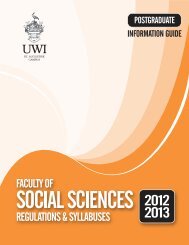Faculty of Humanities and Education (Postgraduate) - The University ...
Faculty of Humanities and Education (Postgraduate) - The University ...
Faculty of Humanities and Education (Postgraduate) - The University ...
You also want an ePaper? Increase the reach of your titles
YUMPU automatically turns print PDFs into web optimized ePapers that Google loves.
POSTGRADUATE REGULATIONS & SYLLABUSES 2012 - 2013<br />
THE FACULTY OF HUMANITIES & EDUCATION<br />
YEAR:<br />
SEMESTER:<br />
COURSE CODE: EDGC 6212<br />
COURSE TITLE: DIAGNOSIS AND COUNSELLING:<br />
FIRST STEPS<br />
NUMBER OF CREDITS: 4<br />
COURSE DESCRIPTION: This course provides a general<br />
introduction to elements <strong>of</strong> counselling within the school<br />
environment. It is aimed at teachers who wish to be able to<br />
make an informed response to the academic <strong>and</strong> non-academic<br />
needs <strong>of</strong> students. <strong>The</strong> course will identify various student<br />
problems that the average classroom teacher may encounter<br />
regularly <strong>and</strong> outline ways to identify <strong>and</strong> work with students<br />
who need help. A major concern is the referral process <strong>and</strong> how<br />
participants can collaborate with colleagues in their school <strong>and</strong><br />
other pr<strong>of</strong>essionals in order to assist students.<br />
Case studies will be a major focus <strong>of</strong> the course.<br />
OBJECTIVES<br />
<strong>The</strong> student will be able to:<br />
1. identify behaviours characteristic <strong>of</strong> students with<br />
problems;<br />
2. initiate contact with students in ways that provide<br />
underst<strong>and</strong>ings to help in the management/mitigation <strong>of</strong><br />
these behaviours;<br />
3. guide students <strong>and</strong>/or families to appropriate resources<br />
<strong>and</strong> support systems for identified problems;<br />
4. develop enabling partnerships with parents <strong>and</strong>/or other<br />
teachers vis-à-vis student cases;<br />
5. make sound ethical decisions about working with <strong>and</strong><br />
consulting about student cases;<br />
6. apply the counselling process within the limits <strong>of</strong> the<br />
teacher’s normal role.<br />
CONTENT<br />
• Characteristics <strong>of</strong> children’s <strong>and</strong> youth’s conflicts with self<br />
• Characteristics <strong>of</strong> children’s <strong>and</strong> youth’s conflicts with<br />
others<br />
• Special topics:<br />
• child abuse<br />
• ‘latchkey’ children<br />
• living with addictions<br />
• death <strong>and</strong> dying<br />
• divorce <strong>and</strong> family re•arrangement<br />
• Consultation <strong>and</strong> referral:<br />
• the role <strong>of</strong> consultation<br />
• the consulting process<br />
• creating a referral list<br />
• Collaboration:<br />
• working with parents: Establishing rapport,<br />
impartiality, data collection, the referral process,<br />
planning <strong>and</strong> goal setting<br />
• working with other teachers: Establishing rapport,<br />
data sharing <strong>and</strong> confidentiality, collaborative<br />
planning<br />
• Legal <strong>and</strong> ethical considerations<br />
• Stages in the counselling process<br />
ASSESSMENT<br />
This course will be assessed through coursework (40%) <strong>and</strong> a<br />
final examination (60%).<br />
REFERENCES<br />
Corey, G. (2001). <strong>The</strong>ory <strong>and</strong> practice <strong>of</strong> counselling <strong>and</strong><br />
psychotherapy (6 th ed.). Pacific Grove, CA: Wadsworth/<br />
Thomson Learning.<br />
Corey, G., Corey, M. S., & Callahan, P. (2003). Issues <strong>and</strong> ethics in the<br />
helping pr<strong>of</strong>essions (6 th ed.). Pacific Grove, CA: Brooks/Cole<br />
Publishing.<br />
Erchul, W. P., & Martens, B. K. (2002). School consultation: Conceptual<br />
<strong>and</strong> empirical bases <strong>of</strong> practice (2 nd ed.). New York: Kluwer<br />
Academic/Plenum Publishers.<br />
Gilhooley, J. (2000). Using peer mediation in classrooms <strong>and</strong> schools:<br />
Strategies for teachers, counselors <strong>and</strong> administrators.<br />
Thous<strong>and</strong> Oaks, CA: Corwin Press.<br />
Goldstein, S., & Mather, N. (1998). Overcoming underachieving: An<br />
action guide to helping your child succeed in school. New<br />
York: Jossey-Bass.<br />
King, G. (1999). Counseling skills for teachers. Thous<strong>and</strong> Oaks, CA:<br />
Corwin Press.<br />
Nelson-Jones, R. (2000). Introduction to counseling skills: Text <strong>and</strong><br />
activities. London: Sage.<br />
Teele, S. (2000). Rainbows <strong>of</strong> intelligence: Exploring how students<br />
learn. Thous<strong>and</strong> Oaks, CA: Corwin Press.<br />
Thompson, C. L., & Rudolph, L. B. (2004). Counseling children (6 th<br />
ed.). Pacific Grove, CA: Brooks/Cole Publishing.<br />
UNESCO. (1982). UNESCO Yearbook on Peace <strong>and</strong> Conflict Studies.<br />
Paris: Author.<br />
Weil, P. (1990). <strong>The</strong> art <strong>of</strong> living in peace: Towards a new peace<br />
consciousness. Paris: Unesco.<br />
Ziv, A. (1977). Counselling the intellectually gifted child. Toronto,<br />
Canada: Guidance Centre, <strong>Faculty</strong> <strong>of</strong> <strong>Education</strong>, <strong>University</strong><br />
<strong>of</strong> Toronto.<br />
YEAR:<br />
SEMESTER:<br />
COURSE CODE: EDSE 6213<br />
COURSE TITLE: INTRODUCTION TO SPECIAL EDUCATION<br />
NUMBER OF CREDITS: 4<br />
COURSE DESCRIPTION: This course provides a general<br />
introduction to the field <strong>of</strong> Special <strong>Education</strong> <strong>and</strong> the study <strong>of</strong><br />
exceptionality. Since the trend in current educational practice<br />
is towards integration <strong>of</strong> special students into the mainstream<br />
classroom, it is not unusual for regular classroom teachers to<br />
have students with exceptionalities in their classes. Teachers<br />
therefore need to be aware <strong>of</strong> <strong>and</strong> sensitive to the characteristics<br />
<strong>and</strong> needs <strong>of</strong> these students.<br />
Case studies will be the major strategy used to identify <strong>and</strong> plan<br />
for these students.<br />
91

















